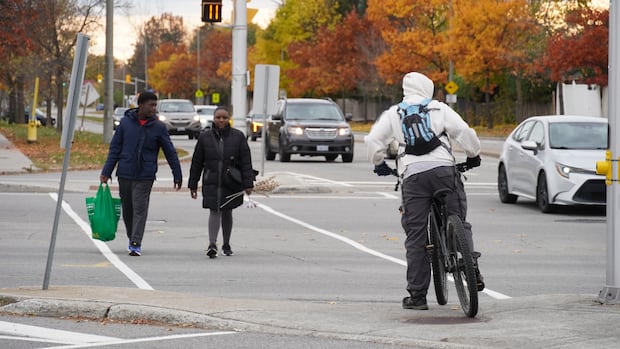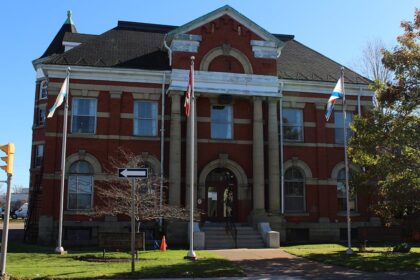OttawaCoun. Laura Dudas says she has been trying to make Orléans Boulevard safer since 2018. But new provincial legislation is threatening Ottawa’s ability to alter its own roadways. Proposed law could affect projects across the city, Laura Dudas worriesGabrielle Huston · CBC News · Posted: Nov 09, 2025 4:00 AM EST | Last Updated: 6 hours agoListen to this articleEstimated 4 minutesThe audio version of this article is generated by text-to-speech, a technology based on artificial intelligence.Orléans West-Innes Coun. Laura Dudas first heard safety concerns about Orléans Boulevard during the 2018 election campaign. She’s since proposed a multi-use pathway, but worries that Bill 60 could hamper those plans. (Gabrielle Huston/CBC)Coun. Laura Dudas says she has been trying to make Orléans Boulevard safer since 2018, but new provincial legislation is threatening Ottawa’s ability to alter its own roadways. “I’m utterly disappointed,” Dudas said. “When the province makes a decision that really dictates what the municipality can do on its own roadways, that is a significant cause for concern.”Bill 60 is an omnibus bill proposed by Premier Doug Ford’s government in October. The provincial news release says the legislation aims to “protect Ontario’s economy” and increase the housing supply.But Bill 60 also prohibits municipalities from reducing the number of lanes available for motor vehicles to add bicycle lanes or “any other prescribed purpose.””[Ottawa city] staff advised me that, you know, not only this project, but projects across the city — anything that includes any piece of cycling infrastructure that would reduce the lane size, that would impact vehicular traffic — could either be on hold or killed outright,” Dudas said.An image of Bill 60 showing the section that restricts municipalities’ ability to reduce car lanes. A highway, as defined by the Highway Traffic Act, refers to any public street, avenue, bridge, square, or highway intended for use by the general public. (Legislative Assembly of Ontario)’A dream for me’Orléans Boulevard is a major artery in the city’s east end, connecting residents to schools, libraries and homes.Dudas said she first heard residents’ safety concerns when she was door-knocking before being elected to council in 2018.”They wanted something safe [so] that they can take their kids to all these places along Orléans Boulevard in one fell swoop and not have to interact with truck traffic or buses,” she said.Dudas said she had proposed a multi-use pathway for cyclists, rollerbladers and pedestrians, one that would run from the Ottawa River past the future LRT station at Convent Glen and all the way to Innes Road. Coun. Laura Dudas said the project on Orléans Boulevard may have evolved and changed according to what consultants thought was possible and community feedback, but staff haven’t even been able to propose their designs yet. (Stu Mills/CBC)”It would just increase the pedestrianization of this section of our community, something that in the east end we don’t have a ton of,” she said. “Orléans Boulevard was a bit of a dream for me.”The project was finally included in the transporation master plan, which Dudas said provided funding for a consultant to determine what changes were possible and then create designs. Now, with Bill 60, “everything is at an impasse,” she said.”My concern is not only the community doesn’t get a decision in their own streets … but also financially the city will have to absorb any costs that we’ve already spent on this work to date.”The proposed multi-use pathway would have gone past the future Convent Glen LRT station, seen here in the background. (Gabrielle Huston/CBC)’Really disturbing’Rob Attrell, a member of both the Convent Glen Orléans Wood Community Association and Bike Ottawa, echoed Dudas’s disappointment.”It’s really important to me because I had transportation options growing up, I took the bus all the time,” Attrell said, adding that he wants his children to have options too.He also argued that better infrastructure for pedestrians and cyclists contributes to the city’s climate change goals and reduces traffic. “It’s a pretty big overreach from the provincial government into municipal affairs,” he said.’It feels like the provincial government kind of has a vendetta against cycling lanes,’ said Rob Attrell. (Gabrielle Huston/CBC)David Shellnutt, a Toronto-based cycling advocate and personal injury lawyer, agreed that the province is intruding on municipal matters.Shellnutt said Bill 212, legislation passed last year that required municipalities to get approval for bike lanes which would remove traffic lanes, had a “chilling” effect that caused municipalities to install fewer of them.”For someone who deals in mayhem and injury and death … it’s really disturbing to me that we have a government that’s dead set on removing protections” he said.The Ford government should be talking to municipalities about what they actually need, said Dudas. Dudas said it’s not clear if the pathway project for Orléans Boulevard would be scrapped or if parts of it could continue under the new legislation. (Gabrielle Huston/CBC)It isn’t clear yet, Dudas said, whether the entire project in her ward would be scrapped or if parts of it could continue under the new legislation. City staff are working to understand the potential impacts in her ward and across the city. Dudas emphasized that the final say about safer roads should belong to the community.”If the community had decided en masse that this was not for them … I would have supported that whole-heartedly,” she said. “But now we won’t even have a chance to have that conversation.”ABOUT THE AUTHORGabrielle is an Ottawa-based journalist with eclectic interests. She’s spoken to video game developers, city councillors, neuroscientists and small business owners alike. Reach out to her for any reason at gabrielle.huston@cbc.ca.Follow Gabrielle on BlueskyFollow Gabrielle on Instagram
Thursday, 5 Mar 2026
Canada – The Illusion
Search
Have an existing account?
Sign In
© 2022 Foxiz News Network. Ruby Design Company. All Rights Reserved.
You May also Like
- More News:
- history
- Standing Bear Network
- John Gonzalez
- ᐊᔭᐦᑊ ayahp — It happened
- Creation
- Beneath the Water
- Olympic gold medal
- Jim Thorpe
- type O blood
- the bringer of life
- Raven
- Wás’agi
- NoiseCat
- 'Sugarcane'
- The rivers still sing
- ᑲᓂᐸᐏᐟ ᒪᐢᑿ
- ᐅᑳᐤ okâw — We remember
- ᐊᓂᓈᐯᐃᐧᐣ aninâpêwin — Truth
- This is what it means to be human.
- Nokoma











